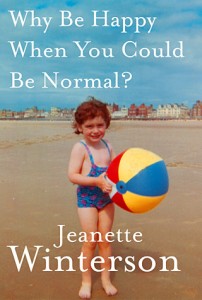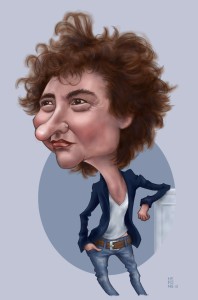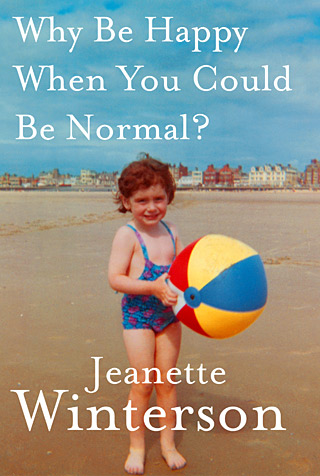 Why Be Happy When You Could Be Normal?
Why Be Happy When You Could Be Normal?
by Jeanette Winterson
Grove Press, 240 pages, $25.
FANS of Jeanette Winterson’s writing may feel that they’ve come to know her life story quite well through the vehicle of her fictional characters as well as her nonfiction writing. There’s the fanatically religious adoptive parents who neglected and abused her, an early love of literature more passionate and enduring than many affairs, her discovery of writing as a means to sort out one’s place in the world, especially in the realm of gender and sexuality—we know all this about Winterson; am I right? Yet try to square the person you thought you knew with this remark: “That night I was wearing a pinstripe Armani skirt suit, a pink vest, Jimmy Choos, and—for reasons I can’t go into here—I had a spray tan.” You might be forgiven for thinking that Candace Bushnell added a paragraph to this memoir as a prank; but no. It’s all Winterson.
This memoir is as lovely and confounding as what we’ve come to expect from a fearless and complex author of novels and memoirs. Winterson describes numerous hardships here, many endured at the hands of her adoptive mother—whom she refers to as “Mrs. Winterson” throughout—while her passive father sat idly by. Routinely denied food, locked out of the house overnight, and ultimately forced to leave home at sixteen when her relationship with a girl was discovered (proving that an exorcism years earlier had failed to eradicate her lesbian desires), these were certainly dark and scary times. But looking back from adulthood, she knew that “I wasn’t ever going to be a nobody,” so she willed a self into existence to carry her through.
The book derives its title from Winterson’s final confrontation with her mother as she was packing to leave. Asked why she was in love with a girl, she could only answer, “When I am with her I am happy. Just happy.” There was a long moment’s pause during which it seemed that Mrs. Winterson might actually understand, before she recovered and asked, “Why be happy when you could be normal?” “Normal” in this case begs a bit more explanation, coming from someone for whom burning her daughter’s entire library of classics constituted business as usual. We can at least recognize how far it lies from happiness in the view of someone bound so powerfully to both religion and her own commitment to misery.
to leave. Asked why she was in love with a girl, she could only answer, “When I am with her I am happy. Just happy.” There was a long moment’s pause during which it seemed that Mrs. Winterson might actually understand, before she recovered and asked, “Why be happy when you could be normal?” “Normal” in this case begs a bit more explanation, coming from someone for whom burning her daughter’s entire library of classics constituted business as usual. We can at least recognize how far it lies from happiness in the view of someone bound so powerfully to both religion and her own commitment to misery.
Winterson lived in her car, managed to put herself through school at Oxford, and by-and-by became the successful literary swashbuckler that we know and love today. But her victories seem to stand on an unstable foundation. After an early long-term relationship ended, Winterson “went mad” and spent several years in crisis, making a journey that led her to seek out her birth mother. Finding her did not so much bring closure as a new set of questions to address and relationships to navigate. And the narrative brings us right up to date in real time: the final paragraph reads in its entirety, “I have no idea what happens next.”
The book is superbly written and, despite the darkness of its subject matter, often hilarious. Mrs. Winterson’s penchant for posting handwritten religious exhortations throughout the house (e.g., “Man shall not live by bread alone” scrawled on a loaf of bread) is neatly skewered in this telling. The outhouse was a special repository of signage: “But in the outside loo, directly in front of you as you went through the door, was a placard. Those who stood up read ‘Linger not at the lord’s business.’ Those who sat down read ‘He shall melt thy bowels like wax.’” Remarks Winterson upon this final note: “This was wishful thinking; my mother was having trouble with her bowels. It was something to do with the loaf of white sliced bread we couldn’t live by.”
Winterson enjoyed these messages and worked them into her life’s narrative. “Fed words and shod with them, words became clues. Piece by piece I knew they would lead me somewhere else.” And so they did.
Why Be Happy? is a generous share of a life lived in pursuit of love, art, and a home. It is also a brilliant portrait of a lower-class upbringing and a lesson in how the determination to succeed can only be born from the fiercest resistance. Perhaps Mrs. Winterson was right and “the Devil led [the couple]to the wrong crib,” as she so often told her daughter. But the alchemy between them, however complex, forged a writer who surely stands as a modern literary original.
Heather Seggel, a frequent contributor to these pages, is a writer based in Ukiah, California.






